THE ROOM NEXT DOOR. A Woman on the Brink of Death [REVIEW]

We are reviewing “The Room Next Door”, the latest film by Pedro Almodóvar, which won the top prize at this year’s Venice Film Festival. But was it deserved? Is it really a good choice?
In his latest film, Almodóvar gracefully tells a story about dying, proving that death doesn’t have to carry negative connotations. Tilda Swinton’s character, Ingrid, learns to come to terms with dying, even seeking the positives in it – for example, that she can leave on her own terms without going through the hardships of illness and losing control over her body. She has cancer but chooses not to undergo chemotherapy. Instead, she prefers to live fully for her last month or two before she actually commits suicide and says goodbye to the world. She is helped in this farewell by Martha, played by Julianne Moore, whom she reconnects with after many years.

“The Room Next Door” feels like a projection of a collection of thoughts directly from the untamed mind of a Spaniard. In this sense, the director’s film works perfectly – it seduces with its subtlety, offering us the charming aroma of life. After watching, you feel like living and seizing each day while we still can.
However, “The Room Next Door” doesn’t work on other levels, particularly in terms of storytelling – the screenwriting falters, likely due to the scripted dialogues. This happens to be Almodóvar’s first full-length film in English, and knowing this fact helps explain the many missteps that (unfortunately) occur in this uneven film. The main criticism is that this intimate story about two empathetic characters feels like a lost episode of a Polish TV show such as “Trudne Sprawy” or “Dlaczego ja?”. Some lines sound like they were written by a twelve-year-old, and the sometimes artificial reactions of the two lead actresses don’t help either. They talk like cardboard cutouts, with a lot of artificiality seeping into their dialogue.
Perhaps this is due to the way Almodóvar directed his actresses or the specific instructions he gave them. One thing is certain, though – his female characters don’t speak like normal people, which makes it harder for us to fully “feel” the story the director is trying to tell. Each of these “failed” lines or “overdone” reactions would probably fit better in Spanish, as they would automatically remind us of the aesthetic of a Spanish telenovela. But as it stands, a beautiful theme is undermined by imperfect execution.

Finally, I would refer to the rating system used by “Little White Lies” magazine, which rates three stages of interacting with a work of art on a 1-5 star scale. In terms of expectations for the new film from the Spanish director, I think we could give it 1 or 2 points. Let’s not kid ourselves: older filmmakers usually don’t “deliver” – they don’t surprise us with projects, as they are no longer in their creative prime. Unfortunately, that’s the climate we live in, and that’s the artistic way of things.
As for the next category, the experience of watching the production and the enjoyment of it, “The Room Next Door” should get 2 out of 5 stars. It’s mainly a slow and overly talkative film that, in this case, doesn’t defend itself with its dialogue. However, we have to give Almodóvar credit for one thing – the film somehow stays with us longer, so the post-viewing impressions and emotions related to it should rightly be rated 3 out of 5 stars. And maybe that’s why you should confront the Spanish director’s new work yourself and decide whether it’s a hit or, in fact, kitsch.

